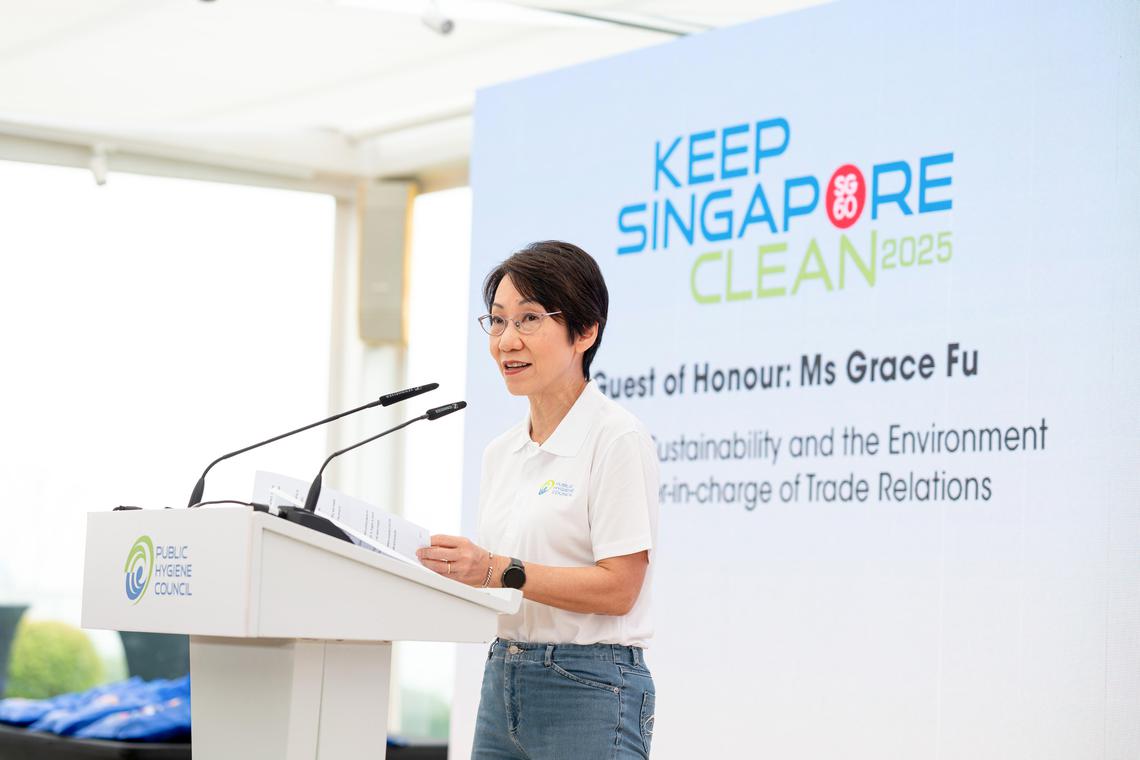SINGAPORE – CleanHood, a new initiative to get schools and community businesses within estates to keep their neighbourhoods clean, was announced by Minister for Sustainability and the Environment Grace Fu at the launch of the annual Keep Singapore Clean 2025 campaign in Sentosa on April 13.
Organised by the Public Hygiene Council (PHC), CleanHood, an enhanced programme formerly known as the Sustainable Bright Spot, aims to cultivate collective ownership among residents, students and merchants by equipping them with resources to keep their common spaces clean.
In 2024, PHC carried out nearly 2,500 clean-up activities. It has supported close to 1,500 Keep Singapore Clean initiatives, and engaged more than 76,000 participants and volunteers nationwide.
PHC also strengthened its corporate outreach with the launch of its Corporate Action Network, expanding its number of partner organisations to 100 from 30 in one year, and signing memorandums of understanding with OCBC Bank and SBS Transit.
PHC aims to expand CleanHood to 15 schools by the end of 2025 to cultivate good public cleanliness habits among young people. The programme will extend to community businesses, including convenience stores, supermarkets and neighbourhood shops, in the coming years.
“For schools, CleanHood will provide wide-ranging resources that educators can tap on to nurture a sense of environmental ownership among students. Students will be encouraged to become environmental advocates through hands-on activities, from designing publicity materials to sharing experiences with their peers during school assemblies,” Ms Fu said.
At the community level, CleanHood will focus on developing community champions, who will be equipped with knowledge and skill sets through workshops to drive environmental initiatives in the community.
“I am certain that this new initiative will complement the National Environment Agency’s efforts to fortify community stewardship in caring for public spaces,” Ms Fu added.
“Good public hygiene is one cornerstone of Singapore’s success and our reputation as a clean city… Many public cleanliness and hygiene issues, such as pest infestation and high-rise littering, can adversely affect our health and quality of life.
“It is therefore timely for PHC to broaden its scope to take on public messaging and outreach for a broader range of public cleanliness concerns,” Ms Fu said.
PHC chairman Andrew Khng said the frequency of SG Clean Day will be increased to once every two months, to create more opportunities to reinforce good public hygiene habits and build a culture of collective responsibility.
As part of this initiative, which started in 2021, there is no sweeping of all public parks, gardens, park connectors, open areas and ground levels of housing estates from 6am to midnight on SG Clean Day. This is to raise public awareness about the amount of litter that piles up without cleaners’ intervention.
“Through initiatives such as CleanHood, the expanded Neighbourhood Toilets Community Group and CleanPods set up islandwide, we are empowering communities to contribute to environmental efforts,” he added.
CleanPods are storage cabinets of litter-picking tools such as metal tongs and rubbish bags that are placed in various parks and Housing Board estates.
To set a new benchmark for environmental stewardship, a PHC CleanHood award to honour partners who champion the Keep Singapore Clean movement was introduced in 2025.
Thirteen partners were honoured at the inaugural CleanHood award ceremony on April 13. Constituencies that received gold awards included Bukit Batok, Bukit Panjang, Boon Lay, Jurong Central, Moulmein-Cairnhill and Zhenghua.
Four silver awards went to Kampong Glam, Marymount, Tampines West and Toa Payoh East constituencies, while Bedok, Kembangan-Chai Chee and Nee Soon Central took the bronze awards.
Ms Fu said: “While the Government will continue to invest in improving our infrastructure and policies alongside enforcement actions, real and lasting change comes from individual ownership.”
She reiterated that it was crucial to continue with the Keep Singapore Clean campaign because “we are having newer generations joining us, we are having a more transient population, new visitors joining us”.
The Keep Singapore Clean campaign was first promoted by the late founding prime minister Lee Kuan Yew in 1968.
Ms Fu said: “Social norming is part of what we have to continue to do. PHC, NGOs… schools have a role to play to ensure that the attitude towards hygiene and cleanliness will continue to be a very strong and critical, integral part of what being Singaporean is about.”
Singapore Polytechnic Students’ Union president Erin Huang, who was among the more than 800 participants in The Great Sentosa Plog on April 13, which was organised by Sentosa Development Corporation, said “about 200 students helped pick up rubbish and helped champion a nationwide effort to make Singapore cleaner”.
Plogging refers to jogging with litter picking.
“We also organise events like a Thrift Carnival, where we encourage students to sell second-hand items to reduce wastage. We also have water conservation studies to evaluate our use of water, flushing in toilets at our campus. We also have a Sustainability Gallery walk where we showcase students’ research and various sustainability initiatives around Singapore,” said Ms Huang, 20.
Join ST’s WhatsApp Channel and get the latest news and must-reads.

